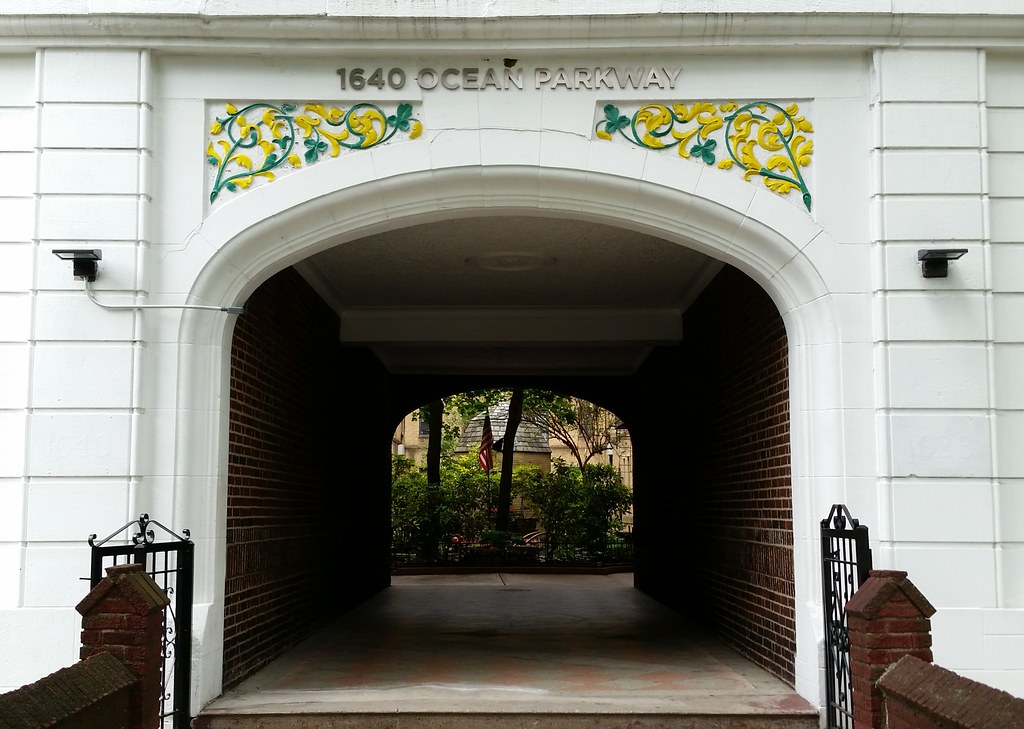
On the morning of January 24, 1929, Raymond B. King, a 30-something-year-old resident of this apartment building, reported to the police that he and his wife had just been robbed in their car in Canarsie. In addition to the vehicle, he said, the perpetrators had stolen around $13,650 worth of money and valuables from the couple.
When he fingered the alleged robbers and tried to press charges, however, his poorly executed scheme quickly crumbled.
Here's what appears to have really happened. Having "squandered" $2,700 that his wealthy father had sent him for business purposes, Mr. King was in need of a story to account for the missing money. So he arranged for two acquaintances from his building, Edward J. Little and Joseph Fitzsimmons, to pretend to rob him while he was out for a drive in a car borrowed from Mr. Little's sister. He brought along a young woman he had met, Mildred Reed, but didn't tell her about the plan, presumably figuring that she could then "honestly" back up his account of the robbery. An added bonus was that, in the course of the holdup, he and his partners could recover the $10 he had given Ms. Reed as a gift earlier in the evening.
Everything went more or less according to plan during the fake holdup. For the sake of authenticity, Mr. King gave the "robbers" $152 and two checks. A frightened Ms. Reed handed over her pocketbook with the $10 in it, and she also threw off her fur coat.
When he reported the robbery to the police, the married Mr. King claimed that Ms. Reed was his wife, and that the bandits had taken $2,450 worth of jewelry and an $1,100 fur coat from her. He also told the cops that, in addition to his "expensive roadster", the men had stolen $2,700 in cash and $7,400 in checks from him.
I suppose the scheme had a chance of working at this point, even though Mr. King was quickly forced to admit that Ms. Reed was not actually his wife. (Did he really think the cops wouldn't find that out?)
But for some reason, while being questioned about the robbers, Mr. King decided to provide the detectives with enough identifying information for them to easily find and arrest Mr. Little and Mr. Fitzsimmons, the last two people you'd think he'd want the cops interrogating. Did he not think pressing charges against his co-conspirators would cause them to turn on him? Did he just assume the police would believe his word without question? And what did he even have to gain here by screwing over his partners — did he think the police would make them give him all their money?
Upon being arrested, of course, Mr. Little and Mr. Fitzsimmons promptly spilled the beans on the whole charade. And then, when the police found the purported $1,100 fur coat that Ms. Reed had been wearing, they discovered it was actually a shabby imitation fur coat, worth no more than $25. Buckling under the weight of his lies, Mr. King folded and admitted the whole thing was a ruse.
So after all that, with their names embarrassingly splashed across the newspapers, the three men ended up arraigned on charges of robbery for stealing $10 and a ragged fake fur coat from Mr. King's fake wife.
Presumably wanting nothing to do with these nogoodniks, Ms. Reed never bothered to appear in court to prosecute them, and so they were turned free. I'm sure Mr. King's real wife was thrilled to see him.
I'm walking every street in New York City.
This is the counterpoint to my walk across the US. Instead of seeing a million places for just a minute each, I'm going to spend a million minutes exploring just one place. By the time I finish walking every block of every street in all five boroughs, I'll have traveled more than 8,000 miles on foot — all within a single city. Details!
Email me at matt@imjustwalkin.com
Subscribe to my email list
Maps: Progress | Photos
Your donations allow me to keep walking full-time. If you think what I'm doing is valuable and you'd like to offer some support, I would be very grateful. On the other hand, if you think I'm a worthless bum, feel free to email me and tell me to get a job, bozo. Both are excellent options!



You just couldn’t invent this sort of a tale~!